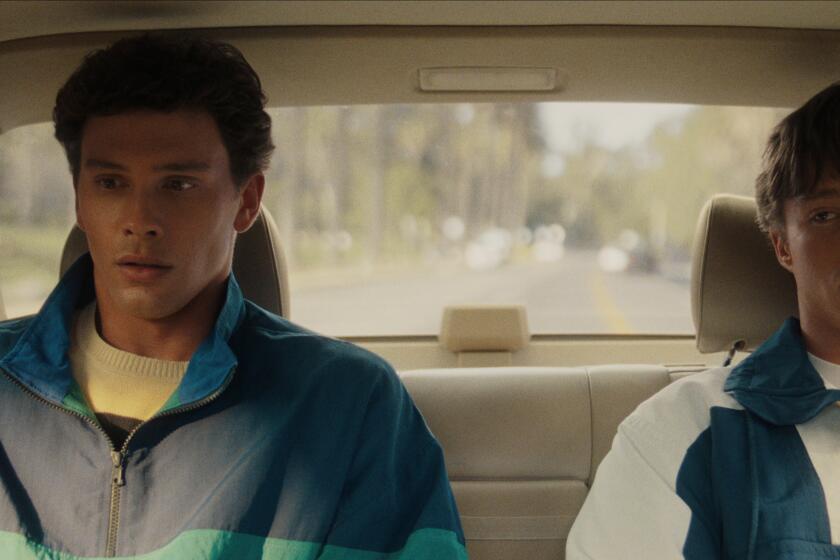Hollywood’s Double ‘Exposure’ : Courts: A writer is awarded $7.3 million by a jury that finds that his script contained the basic idea for TV’s popular ‘Northern Exposure.’
It’s a cynical credo of the screenwriting world that there are only so many basic stories (seven is the number, according to some). Certainly, in the world of television, everything starts to sound the same. This is, after all, the season with two drama shows about doctors, both set in Chicago.
But sometimes things seem a little too similar for a writer’s comfort.
That’s what veteran television sitcom writer Sandy Veith thought in 1990 after the summer debut of the quirky and now much-acclaimed “Northern Exposure” television drama. Eight years before the premiere of “Northern Exposure,” a television show about a young Jewish doctor from New York who is forced to repay his medical school bills with service in a remote Alaskan town, Veith had written a show called “Coletta” about a young Italian-American doctor from New York who was forced to repay his medical bills with service in a small Southern town. “Coletta” was never produced, but the script made the rounds.
“When ‘Northern Exposure’ came on the air, he started getting calls from people saying, ‘God, I can’t believe what I saw on TV--it’s just like your show,’ ” said Veith’s attorney, Glen Kulik. A Superior Court jury agreed on Monday. It ordered Universal City Studios, which produces “Northern Exposure”, and its parent company, MCA, to pay Veith $7.3 million in damages.
Fierce fights over credit are legion among Hollywood television and film writers, but most get decided by Writers Guild arbiters. A few make it to court. In one of the more famous cases of the last few years, humorist Art Buchwald and producer Alain Bernheim were awarded $900,000 for a 2 1/2-page story treatment that they argued was the basis for Paramount’s “Coming to America,” starring Eddie Murphy.
But rarely does someone go to court and win as much as Veith over an issue that involves a fight over whose idea was the basis for a show.
Veith, 45, developed his script while under contract to Universal from 1981 to 1986. His contract called for him to be paid for any shows Universal produced based on work he had written. Veith’s attorneys argued that Universal, which produces “Northern Exposure,” breached its contract with Veith and owed him compensation for lost credit.
“We’re very confident, but we know it’s not over,” said Kulik, anticipating an appeal by the studio. “We don’t want to celebrate too heartily.”
And Veith himself, a man who once worked steadily in sitcoms such as “The Jeffersons” and “Diff’rent Strokes,” but found writing offers scarce as he waged war against Universal, is being scrupulously cautious. He won’t talk at all. Even his answering machine on Tuesday left the desultory greeting: “You heard right, leave a message.”
Lou Petrich, the attorney representing Universal, said he will file motions asking the court to either reduce the award or throw the judgment out. “They wouldn’t have taken this to court,” Petrich said of his clients, “if they didn’t believe this was a pure case of independent creation.”
The similarity of premises alone did not win Veith that lottery-jackpot-size judgment. The popular fish-out-of-water theme annually spawns numerous television and movie variations.
There were other factors. Some of the same Universal executives who worked with Veith also worked with Joshua Brand and John Falsey, the highly respected creators of “Northern Exposure,” “St. Elsewhere” and other shows. No one has accused Brand or Falsey of stealing Veith’s idea. Petrich said jurors appeared to believe that Universal executives conveyed the idea somehow to Brand and Falsey.
Further, according to attorneys for both sides who talked to jurors after the decision, jurors were suspicious of Universal executives who said they could not remember what was talked about in meetings about “Northern Exposure.”
“There was stuff (from jurors) like ‘How come an executive who makes so much money can’t remember what happened in a meeting five years ago?’ ” Petrich said. “I think in all these cases if you have an individual against a large company, if the jury is going to err, they’re going to make a mistake for the little guy.”
Veith’s attorney sees it differently. “If you read these two scripts and put together access and timing . . . and knowing how the studio system works, it was inconceivable to us that this thing could have been independently created,” Kulik said.
Ideas are slippery things. In this case, one attorney’s dramatic similarities are another attorney’s laughable coincidences.
Kulik argued that both lead characters in the two shows made long journeys to the small towns in which they would work.
So what? Petrich countered. “They both start with the characters going to the place where they worked,” he said dryly.
Kulik argues that the lead of “Coletta” has a love interest in a woman named Megan who is from an upper-crust Midwestern town. In “Northern Exposure,” the love interest is a woman named Maggie, who hails from an upper-crust Midwestern town.
Both characters have “unconventional jobs” for women, Kulik points out. Petrich says that’s no big deal: “In (‘Northern Exposure’) she’s a pilot, and in the other show she’s a veterinarian--they think that’s similar.”
In any case, Brand and Falsey maintain that they didn’t get any ideas from Veith.
“Neither one of us to this day has ever read the script or met Mr. Veith or been told by Universal about the existence of the script prior to ‘Northern Exposure’ being televised on CBS,” said Brand in a phone interview Wednesday. “We think it’s an unfortunate situation.”
And then there’s the other credo of Hollywood: It’s not an idea that makes a successful show, it’s the execution 23 times a season. One of the reasons Veith got such a large award was because “Northern Exposure” has been such a successful show--and the jury concluded that Veith would have been capable of guiding it to that success.
During much of the trial, Veith had to sit there and hear otherwise. “These people who hired you and worked with you are saying, ‘Oh, he’s basically no good,’ ” recalled Kulik, who said the trial was “emotionally and financially draining” for his client.
But, Kulik argued, “Had he been given the credits . . . he would have gotten to write and produce other things.” Or he might simply have gotten rich: “There are pretty much people in this business who have lived off one series.”
If Veith’s award survives counterattacks by Universal, the screenwriter may have found his way into their ranks.
More to Read
The biggest entertainment stories
Get our big stories about Hollywood, film, television, music, arts, culture and more right in your inbox as soon as they publish.
You may occasionally receive promotional content from the Los Angeles Times.











